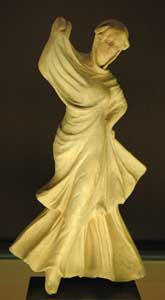|
|
Der Tanz im antiken Griechenland
Plato said that dancing (orchesis) "was the instinctive desire to explain words by gestures of the entire body" “The Eleusinians have a temple of Triptolemus, of Artemis of the Portal, and of Poseidon Father, and a well called Callichorum (Lovely dance), where first the women of the Eleusinians danced and sang in praise of the goddess On their market-place the Spartans have images of Apollo Pythaeus, of Artemis and of Leto. The whole of this region is called Choros (Dancing), because at the Gymnopaediae, a festival which the Lacedaemonians take more seriously than any other, the lads perform dances in honor of Apollo. Going forward about a stade from the grave one sees traces of a sanctuary of Artemis, surnamed Cordax because the followers of Pelops celebrated their victory by the side of this goddess and danced the cordax, a dance peculiar to the dwellers round Mount Sipylus.” Pausanias
I desire to hire from you Tisaïs, the dancing girl, and another, to dance for us at our festival of Bacchias, for fifteen days from the 13th Phaophi by the old calendar. You shall receive as pay 36 drachmai a day, and for the whole period 3 artabai of wheat, and 15 loaves; also, three donkeys to fetch them and take them back. Letter of Aurelius Asclepiades to Aureleus Theon, c. 295 AD, Paul Halsall Ancient History Sourcebook: Accounts of Personal Religion, c. 430 BCE - 300 AD Girls were required to run and exercise so that their babies would grow in strong and healthy mothers. To make them brave, Lycurgus ordered that occasionally the girls had to dance and sing naked in front of all the young men. Therefore the girls were ashamed to be fat or weak, and they were happy to display their beauty to such an appreciative audience. In their songs, the girls praised the men who were brave and strong, and they made fun of those who were weak and cowardly, so they sharpened the men's love of glory and fear of shame. Plutarch,
|

